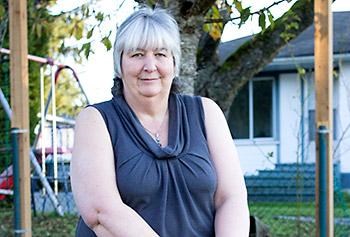For some health care workers in the province the choice between being vaccinated against the flu and wearing a surgical mask at work is no choice at all.
Debbie Hodges is a psychiatric nurse at Powell River General Hospital. She risks severe allergic reaction if she comes into contact with the flu vaccine and may not be able to do her job if she is required to wear a mask while on shift.
She is one of many health care workers who took their concerns to the union, Health Sciences Association of British Columbia (HSABC), last year when the ministry of health’s policy was announced last fall. It states that health care workers who do not want to take the flu vaccine must wear a surgical mask while performing duties that bring them into contact with patients during flu season, which could run from late November to March. The policy outlines progressive levels of discipline for employees who do not comply with the policy, including dismissal.
HSABC filed a grievance against the provincial policy. However, last week Robert Diebold, a BC Labour Relations Board-appointed arbitrator, ruled that the policy is a reasonable and valid exercise of the employer’s management rights.
“Health care workers do not have to immunize; they have a choice to immunize or mask during the influenza season,” wrote Diebold in his decision handed down Wednesday, October 23.
Hodges said she is not against vaccinations—just the ones she’s allergic to.
“I’ve been vaccinated for just about everything under the sun,” she said. “The only thing I’ve ever reacted to was the flu shot and typhoid vaccine. I’ve got nothing against vaccines.”
She is, however, aware that there are people who are concerned that the evidence around the flu shot is very shaky, she said.
She added she’s disappointed with the ruling because it puts her into a difficult position. “I work in acute psychiatry and a lot of our job is communicating and wearing a mask prohibits that,” she said. “It’s not allowing me to be able to de-escalate situations so it could put me or other people at risk. It’s just not an ideal situation.”
Hodges said circumstances in her job vary and in some cases wearing a mask, while perhaps reducing her effectiveness, may work, while in others it may not. If she needs to visit the medical floor of the hospital to assess an elderly patient’s level of dementia she said she would wear a mask and explain to the patient why she needed to wear the mask. However, she questions how she would be able to do her job wearing a mask if a psychotic person is brought into the hospital in handcuffs.
“I’ve got to go down there to build rapport—how can I do that wearing a face mask?” she asked. “I just don’t think this is good for me or my patients if I have to wear a mask. I don’t think I can do my job effectively wearing a mask.”
Dr. Perry Kendall, BC’s provincial health officer, called Diebolt’s ruling “a win for patients and residents of long-term health care facilities.”
Kendall estimates that between 68 and 72 per cent of BC health care workers were vaccinated against influenza last year, but that more persuasive measures are required to safeguard the public.
The union is encouraging compliance with the ruling and has advised its members that employers are required to make accommodations in special circumstances.
If this flu season goes like last year’s Hodges does not expect to have any trouble adhering to the policy as much as possible.
She said that last year Powell River did not have an outbreak of the flu, so she did not encounter any difficulties, but if it was announced that there was a flu epidemic this season, she would accept being sent home.
“With or without pay depends on whether they’ll accept my doctor’s letter,” she said.



